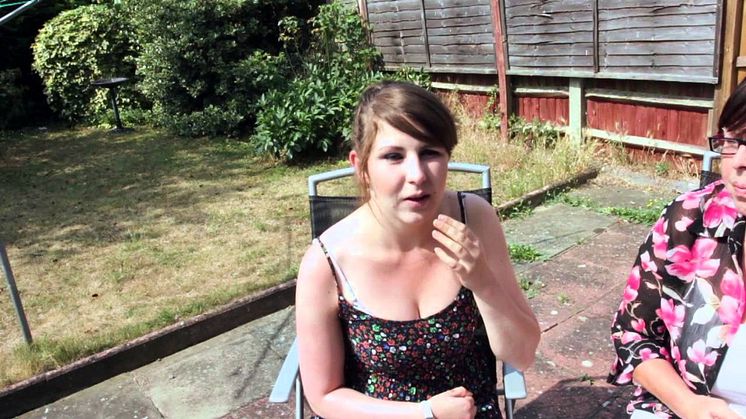
Press release -
Rainham stroke survivor finds her voice
Rainham resident Amber Garland, 26, is on the road to recovery after a stroke left her unable to talk in 2009.
Amber was just 19-years-old and studying psychology at university when she had multiple strokes. Amber woke up in hospital after being unconscious for a week to discover she could no longer walk, talk or swallow.
Despite the impact of her strokes, Amber was been determined to find new ways to communicate again. After a month the only word Amber could say was ‘hello’, but with the help from speech therapists and support from the Stroke Association, Amber was able to regain some of her speech back again after a year.
Amber went on to complete a three year course in art and design at Mid Kent College and is now an Ambassador for the Stroke Association, raising awareness of aphasia in the community by doing talks and events in local schools and businesses across Kent.
Amber said: “It was so scary. My brother, Jamie, had to sign a do-not-resuscitate order – it was terrifying for the whole family. Life is completely different since my stroke, but I’m not going to let it beat me. I’m so grateful to the Stroke Association for their support and really enjoy helping the charity raise awareness of stroke and aphasia.”
Amber is one of more than 350,000 people in the UK with aphasia, a communication disability which can affect people’s ability to speak, read, write, use numbers and understand but not their intelligence. Aphasia is caused by stroke, head injury or other neurological conditions.
Amber says that one of her the biggest challenges is that many people do not know enough about aphasia or how they can help people with the communication disability. She still finds it hard to speak to people who don’t know her, and often feels frustrated when people dismiss her. Amber now has a support worker who helps her on a daily basis.
Tara Galloway, Assistant Regional Manager at the Stroke Association, said: “Amber has shown incredible determination in their recovery. Not only has she shown overwhelming tenacity in rebuilding her life, but she’s giving her time to support others. We’re so proud of all she’s achieved.
“Having aphasia can be so frustrating because many stroke survivors know what to say, but are unable to make themselves understood. Seemingly ordinary tasks like buying a pint of milk or using money can feel very stressful, and it is easy to lose confidence. Many people with aphasia can feel very isolated as a result.
“If people working in shops, cafes, banks and a huge variety of other customer service roles know about the disability and follow a few of our simple tips, the barriers to communication can be start to be broken down.”
The Stroke Association is raising awareness of aphasia and how people in the community can help support stroke survivors affected by the condition. To support this campaign, you can go to stroke.org.uk/aphasia or search for #aphasia on social media.
Related links
Topics
A stroke is a brain attack which happens when the blood supply to the brain is cut off, caused by a clot or bleeding in the brain. There are around 152,000 strokes in the UK every year and it is one of the largest causes of disability. There are over 1.2 million people in the UK living with the effects of stroke.
Stroke Association is a charity. We believe in life after stroke and together we can conquer stroke. We work directly with stroke survivors and their families and carers, with health and social care professionals and with scientists and researchers. We campaign to improve stroke care and support people to make the best recovery they can. We fund research to develop new treatments and ways of preventing stroke. The Stroke Helpline (0303 303 3100) provides information and support on stroke. More information can be found at www.stroke.org.uk











